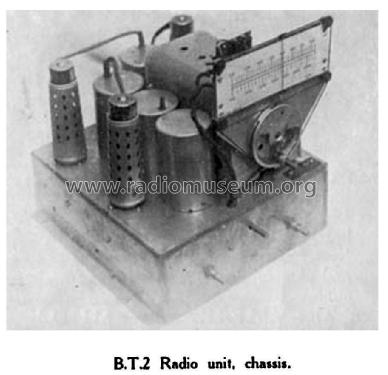Radio Unit BT2
Lowther Manufacturing Co; Kent
- Land
- Grossbritannien (UK)
- Hersteller / Marke
- Lowther Manufacturing Co; Kent
- Jahr
- 1936
- Kategorie
- Rundfunkempfänger (Radio - oder Tuner nach WW2)
- Radiomuseum.org ID
- 340723
- Anzahl Röhren
- 3
- Hauptprinzip
- Geradeaus allg. (mit oder ohne Rückk.)
- Wellenbereiche
- Langwelle, Mittelwelle (LW+MW).
- Betriebsart / Volt
- Externes Speisegerät / Netzgerät / Hauptgerät / 4, 250 Volt
- Lautsprecher
- - Für Kopfhörer oder NF-Verstärker
- Material
- Metall, SICHTBARE RÖHREN
- von Radiomuseum.org
- Modell: Radio Unit BT2 - Lowther Manufacturing Co; Kent
- Form
- Chassis - Einbaugerät
- Bemerkung
-
Radio Unit, BT2
The BT2 has been totally re-designed and will deal with most of the more powerful stations both during the day and after dark.
It consists of a "constant bandwidth" band-pass coupling the aerial to the grid of the first HF Pentode, followed by a tuned HF transformer coupling to the second HF Pentode.
Screening between each stage is very comprehensive, also de-coupling between high-tension lines. A second tuned HF transformer feeds the diodes of the double diode triode detector and first LF except that one diode is used for AVC purposes the circuit is as BT1 from the detecting diode onwards.
In order that the sensitivity shall remain constant over the entire waveband, a resistance is automatically brought into use on the first valve over the lower wavelengths.
Variable tone correction is employed on radio and is totally changed upon switching over to gram.Power supply required: 20 mA, 250 volts; 4 volts at 3.6 amps for heaters, etc.
Controls: Tuning, Tone, Volume, Long, Medium, and Gram switch.
Connections: Speech and Earth - two-pin socket
HT and Heaters: 5-pin plug and socket.
- Originalpreis
- 10.50 GB £
- Literaturnachweis
- - - Manufacturers Literature (Lowther Voigt Radio, Season 1936-37, Page 16.)
- Autor
- Modellseite von Gary Cowans angelegt. Siehe bei "Änderungsvorschlag" für weitere Mitarbeit.
- Weitere Modelle
-
Hier finden Sie 56 Modelle, davon 51 mit Bildern und 2 mit Schaltbildern.
Alle gelisteten Radios usw. von Lowther Manufacturing Co; Kent
